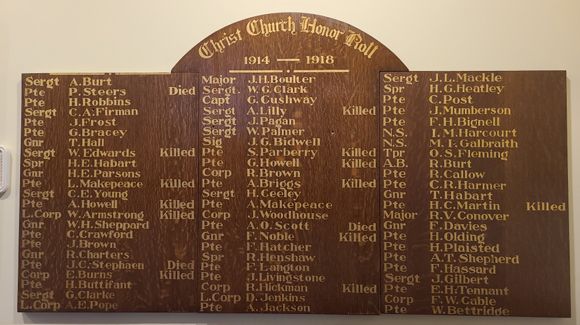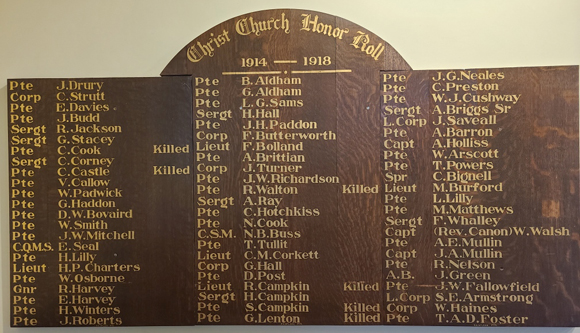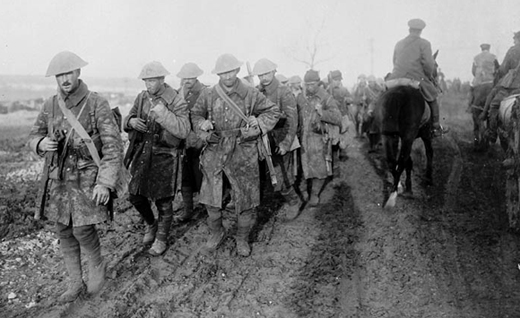
Letters From The Front
At this time of year as we pay homage to those who perished in the Great War we strive to honour our most fervent commitment to them: to remember them and the sacrifice that they made for us. One way to do so is to consider the experiences, observations and very words of those serving in France over 100 years ago. This article is based on eight letters written from members of the first contingent of the Canadian Expeditionary Force (CEF) in 1915, as reprinted in The Conservator, Brampton’s local newspaper of the time. You can see some of them here. The letters were published in the March 18, March 25 and April 1, 1915 editions and were written in February and March, 1915.
The Writers
The eight letters were written by seven men, most, if not all of whom, were serving with the 36th Peel Regiment. Two of the letters were written by Lieutenant Reginald Van Every Conover, who had been a member of the Halton Rifles, a militia regiment before enlisting. Conover, born in 1891, was a teacher. He was a member of the bible study group of Christ Anglican Church in Brampton, as were a number of the early Brampton recruits. His letters were written to his parents, who were obviously supportive of his enlistment. Before he left Canada for England, his parents visited Valcartier, Quebec, where the First Contingent undertook their training, a matter reported on by The Conservator.
The newsy letter of Lieutenant Frank Stewart Rutherford was written to his sister Miss Gertrude Rutherford, a Brampton resident. Rutherford was a civil engineer before he enlisted at 26 years of age.
Lance Corporal Arthur Makepeace was a 22 year old labourer when he enlisted. His attestation papers, signed in September, 1914 at Valcartier, note his religion as that of Church of England.
Private Jack Pagan was just 19 years old when he enlisted. A printer, he may have felt he was returning home in joining the CEF. His attestation papers show his next of kin as residing in Salisbury England. He too was a member of the Brampton Christ Church bible study group.
Henry T. Robins was born in Plymouth, England. A tinsmith, he enlisted at the age of 23.
Gordon Brown of Norval and Robert Brown, who are not likely related, also wrote to their parents. The personnel records of the CEF include two thousand men with the last name Brown. Despite our efforts (looking only at those who enlisted in 1914 and who had a connection to Peel County), my researcher Colleen Mahoney and I were not able to identify with certainty, which of those records pertained to these two men.


The Trenches
Among the many horrors of that war to those of us living in our comfortable, insulated, brick homes is the notion of the members of the CEF living in subterranean, muddy, rat infested trenches. Nearly all of the letters speak to that mud and the efforts that had to be taken to clear it.
When not bailing and pumping the trenches, or standing on guard within them, the men made and repaired trenches, filled sandbags for the parapet and constructed barbed wire entanglements. Much of the work occurred at night under skies illuminated by search lights and shells. As Makepeace said in his letter published on April 1:
We have to work all night fixing the trenches. Every now and then the Germans throw up a shell, called a Star Shell which illuminates the whole place up for several seconds and that is the time we have to look out for we have to stoop as low as we can and keep perfectly still. You know we have to get out of the trenches to fix them and we are fired on for the Germans never miss an opportunity.
The men took turns standing on guard—at one point the duty was to be fulfilled every other day at others it was two or three days at a time. Presumably some of the down time was spent in the dugouts described by Conover, although none of the writers ever report resting in one.
The men have dugouts built in the walls of the trenches for sleeping apartments. The officers have another, a trifle larger where they have their mess. They have a stone in it for cooking. The men have charcoal braziers in their dugouts for cooking and heating purposes.
The muddy conditions in which the men served also had an effect on the ability of the Allied troops to advance against the enemy. As Rutherford noted, the Germans were under the same difficulty.

Behind the Trenches
Fortunately, the amount of time spent serving in the trenches was limited; a week at a time according to Rutherford. Service at the front in France (at least for the fortunate) seemed to be a continual process of moving to and from the trenches. After a tour of service in the trenches, men moved back staying in possibly three sets of billets of varying distances from the line: three miles, 10 miles or 20 miles. The billets took the forms of houses, barns and even pubs—something that seemed quite shocking to Rutherford. (There were at the time no bars or pubs in Brampton.) In addition to catching up on much needed sleep, during the day the men marched. The conditions in one billet were quite satisfactory according to Gordon Brown. The men were served tea and coffee at all hours.
But not all billets were as hospitable. In describing another billet about two miles from the trenches, Robert Brown said that the city they were billeted in was badly shelled and deserted. The house they were in was smashed in two and all the windows were broken.
Medical
Being so early in the war the men did not have to contend with the as yet unheard of Spanish flu. Their scourge instead was Scarlett fever. Gordon Brown reported four suspected cases in his battalion. He and his men were then stationed in an unfinished hospital. It had very few windows in it and no fires. The floors were made of cement and the walls were very damp.
Losing men and friends
There were of course injuries and losses of life. Rutherford reported the loss of his section commander while working in the front line of the trenches. Conover reported the injury of one of his men—hit in the nose by a sniper’s bullet.
The Allemand paid dearly for his fun as one of my men brought him out of his perch in an elm tree about 300 yards from our trenches…
The first Bramptonian in the company to be wounded was Corporal Walter Clarke. The injury was reported in The Conservator on March 25 under the heading: W. G. Clarke in honour roll – first Bramptonian to be wounded in action in France – received bayonet thrust in shoulder – now in the hospital recovering. Only in reading the letter of Conover in the next week’s April 1 edition of The Conservator was the cause of the injury revealed. Clarke had been attacked by an allied soldier.
He was taking a message from one dispatched [sic] post to another for one of the officers and had to run from one post to the other as there was no cover. A fool sentry lost his head and bayoneted him.
His injuries were serious but he was expected to make a full recovery.
Germans
The men took their service seriously and though there were occasional writings of bravado (see Conover above re the Allemand), they knew what they were up against in the opposite trenches. Conover said:
… the Germans are mighty fine shots with their rifles. They are equipped with telescopic sights and can hit a man’s head every time it appears. Fortunately the Saxons occupied the trenches opposite us and they are rather less vindictive than the Prussians who are regular devils.
Pagan echoed these views.
The Germans have some wonderfully accurate shots amongst their snipers and it is these fellows who are causing the deaths of the majority of our men in the present mode of trench fighting.
The Germans were very close to the Brampton boys both adding to and limiting the danger. With a mere hundred yards separating them, Conover reported being able to hear the Germans laughing, talking and singing.
Culture wars
The letters provide some lighter fare as well. Two men commented on the French. Gordon Brown expressed his distaste at the extent to which their French hosts talked with their hands. “I am not much in love with these jabbering Frenchmen, who talk with their feet hands and arms besides their tongues.”
Rutherford admired the way the French carried on with their life notwithstanding the mayhem around them.
One peculiarity which we have noticed is the comparative easiness with which the peasants seem to go about their work of farming even within range of the German guns. While we were working on the trenches last week a farmer upon whose farm we were working started threshing grain.
Gordon Brown pledged not to drink French water. He would limit his liquid intake to coffee, tea or “grape wine”. Possibly as a sop to his parents in the teetotalling Peel County, he declared the fermented drink to be no stronger than water.
Their opinions regarding the British though were universally positive. Rutherford wrote that the British Royal Engineers have done very creditable work and have set us a good example to live up to. Conover praised the accuracy and rapidity of the English rifle fire.

It isn’t all bad…
The men knew what to say to ease the worries of those at home—and possibly it was to some extent heartfelt. Gordon Brown wrote that the food was plentiful and sleeping accommodations good. He was at that time out of the trenches. But in the next paragraph he even complimented the food in the trenches, which he said was fine. “We couldn’t live better if we were in Canada.” Possibly he effuses too much.
Conover wrote that the trenches “are not so bad, they have boards on the bottom which keeps men out of the mud.” In another letter, Conover reported that the men were cheerful.
The men did have a sense of humour about it all. Robert Brown reported that he was having a fairly good time but that travelling on the continent was “not what it is cracked up to be.” Gordon Brown pledged not to get in the way of the Huns unless he thought he needed “a little rest.”
It is possible that some of this was said to entertain or appease the censors, the threat of whose thick pen restrained some of the writers. “I might tell you a good deal more,” Rutherford wrote, “but we have to be very careful as all our letters are censored to see that no information of any value is given out.”
But more likely though what they had experienced was grim, they had not yet experienced the far worse that was to come. (See the Ask Colleen article to read about the big battle that followed the writing of these letters.)
Requests from home
Of course the letters contained requests. Some requests were made for deliveries of socks, handkerchiefs, envelopes and writing paper. But what the men wanted most, was letters from home. We must concede that the interest we have in the letters they sent home is but a fraction of the comfort they would have received in the letters sent to them.

To Order Your Copy of
The Beleaguered
select one of these links.


